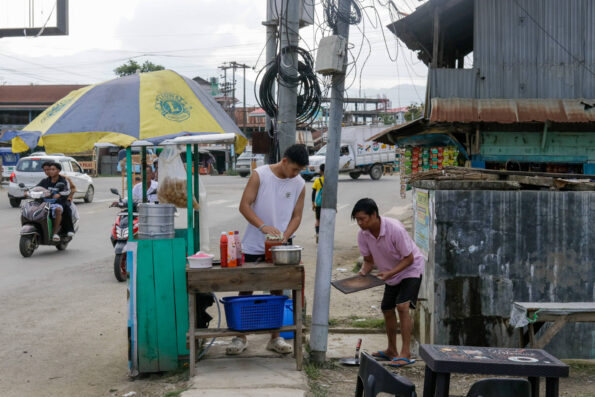
Kalpana Khanal, GPJ Nepal
Across the rural Dhading district of Nepal, nearly 80 ropani (10.6 acres) is thought to now be fallow. Lack of available farmhands is among the top reasons why.
DHADING, NEPAL — Nearly half of Thulo Kanchha Tamang’s farmland is fallow.
Tamang, 68, has been a farmer since he was 16. It’s long been his livelihood, but these days things are more difficult.
Tamang and his wife live in the Dhunibesi municipality of Dhading district, about 85 kilometers (52 miles) from Nepal’s capital, Kathmandu. Together, they care for 12 ropani (1.5 acres) of land. Their four children – two sons and two daughters – have left home and don’t want anything to do with farming.
That has become common here.
Their daughters are now married and live in Kathmandu. And both sons chose to work abroad, rather than take up the family business. Their oldest son has been in Qatar for five years, while the youngest went to Dubai three years ago.
“When I tried to stop my oldest son from going abroad to do farming here instead, he told me that there is not any income from farming,” Tamang says. “It’s not only my sons who are working abroad. It’s difficult for us to find any young person in the village.”
Young people here have turned away from farming in favor of more lucrative opportunities in the capital or abroad.
“In my time, those who had large areas of land were considered to be rich people,” Tamang says. “But now it has become very difficult to find people to even work in farming.”
Tamang still manages to grow some crops on 7 of his 12 ropani (1.5 acres) of land, with the help of some friends in the village. The other five are barren now.
The nationwide shortage of agricultural workers has had a negative impact on landowners throughout the country. As more and more young people opt to leave the country for higher-paying opportunities, vast areas of land have become fallow, due to lack of available labor.
Bhishma Kumar Bhusal, director general of the Department of Foreign Employment, says as many as 1,000 to 1,500 workers between the ages of 18 and 45 leave Nepal for employment opportunities abroad every day. He estimates that at least 3.5 million Nepalese men currently work abroad.
That’s left a significant portion of Nepal’s farmland without hands to till it.
According to 2018 data published by Nepal’s Ministry of Land management, Cooperatives and Poverty Alleviation, 5.49 million hectares of land are being farmed throughout Nepal. But another 1.03 million hectares now lie fallow.
Chandra Mani Adhikari, an economist, says domestic food production in the country continues to fall as import prices rise. The root of the problem, he agrees, is young people who no longer wish to take up farming.
“Lands are barren as both skilled and unskilled [workers] are leaving the country for foreign employment,” he says. “This has led to the rise in food imports.”
Nepal’s latest agricultural census report shows a decline in production for nearly every food staple: paddy and wheat are down by 6%, maize is down by 12%, millet is down by 19% and barley is down by 35%.
Meanwhile, the country’s total food import bill jumped to 51.8 billion Nepalese rupees ($458 million) in fiscal year 2018-19, from 45.42 billion rupees ($402 million) in fiscal year 2017-18, says Shishir Ghimire, spokesperson for the Department of Customs.
“Overall, food [prices] are on a rising trend,” he says, adding that the country’s reliance on imported and processed foods is also rising.
Now, the government has introduced a bill that if passed would prohibit people from letting fertile land go to waste when they work abroad.
“It doesn’t mean leaving to work abroad is a crime,” says Janak Raj Joshi, spokesperson at the Ministry of Land Management, Cooperatives and Poverty Alleviation. “Those who want to travel abroad are allowed to go, but they must ensure their land is taken care of to prevent land from going barren before they go.”
The new bill stipulates that land owners must either secure people to work their land before leaving the country or face a fine of up to 300,000 rupees ($2,600) if they leave arable land barren, he says.
The bill was approved in 2019 but tabled in Parliament.
The new bill sounds like a good idea, says Sarita Khatri, 40, a widow who lives in Dhading district. After her husband died seven years ago, her brother-in-law left the farm to seek employment abroad. Now, more than half of her 10 ropani (1.3 acres) of land is barren.
“I have cultivated crops in some parts with difficulty. But I left the slopes fallow, because it’s hard to work there,” she says. “It’s difficult to farm alone. Working-age people in the village are abroad. I cannot find anyone whom I can ask for support.”
But others say the new bill doesn’t take into account how difficult it is to find people to work on local farms.
Janaki Shrestha, 33, says she and her husband used to grow potatoes, okra, pumpkin and other vegetables on their 8 ropani (1 acre) of land.
But farming is hard work, she says. The frequent strikes that prevented them from getting their produce to market, the sweltering heat and the pests that regularly destroyed their crops all incentivized her husband to go to Qatar in search of a better job in 2016.
“We would grow crops, braving rain or sweltering heat. But our income would not cross even 30,000 rupees ($260),” she says of their monthly salary. “Frustrated with this occupation, my husband went abroad.”
Now, he makes more than 80,000 rupees ($693) per month, but she and her daughters cannot work that much land alone, she says. Like Khatri, she says it’s nearly impossible to find workers willing to work on small, local farms.
Sagar Ghimire, GPJ, translated this story from Nepali.







